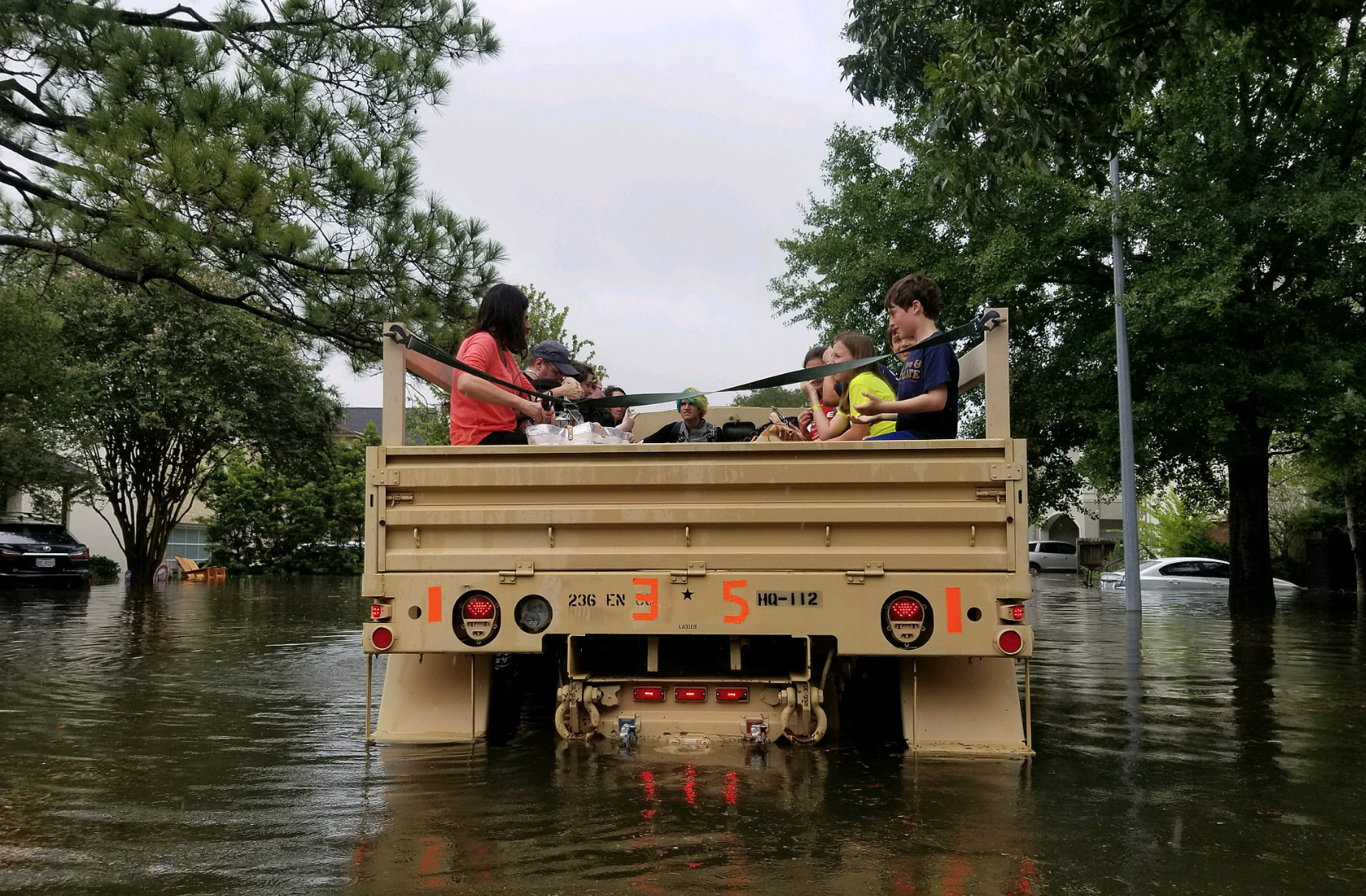How does urbanization affect flooding? Like this:
"Removing vegetation and soil, grading the land surface, and constructing drainage networks increase runoff to streams from rainfall and snowmelt. As a result, the peak discharge, volume, and frequency of floods increase in nearby streams. Changes to stream channels during urban development can limit their capacity to convey floodwaters. Roads and buildings constructed in flood-prone areas are exposed to increased flood hazards, including inundation and erosion, as new development continues."
That's from Christopher Konrad, a research hydrologist with the United States Geological Survey. But in short: development changes the way water flows over the landscape and into streams and rivers.
In Houston, this has been something researchers and concerned citizens have been watching for awhile now. Groups like the Katy Prairie Conservancy have been trying to protect natural wetlands as a buffer against flooding as the city grows. "It looks like wildlife preservation, but it’s really protecting the city,” is how Jaime González, community conservation director with the conservancy, put it back in 2016.
There are a lot of things that contribute to the worsening of this situation but it's the amount of impervious surfaces, like concrete, covering the sprawling city's footprint that is particularly worrying to Kinder Institute Fellow Sam Brody, a professor with the department of marine sciences at Texas A&M University at Galveston. He has also argued for better flood zone designations. “We’re celebrated for our economic growth,” he said in 2016, “but at the same time, we’re being dragged down by chronic and acute flooding events.” And his team found that it was a particular type of development doing the most damage: high-intensity development decreased flood damage losses over the study period, while low-intensity sprawl amplified it. Others have added to this conversation as well. Though some have tried to blame the lack of citywide zoning for the devastation, Houston does in fact have plenty of land-use regulation and much of it encourages sprawling development, an important thing to keep in mind.
Then there's another layer of man-made decisions adding to the devastation. Federally-funded apartment complexes like Arbor Court, which serves low-income residents and has flooded repeatedly in recent years, was constructed in a flood zone and continues to have its contract renewed with the federal government, even as families are regularly displaced from it. These decisions also exacerbate what are already deep disparities in who bears the brunt of natural disasters.
Hurricane Harvey is unprecedented, it's true, but many have been warning that Houston is increasingly at risk for such unparalleled destruction. An in-depth story from the Texas Tribune and ProPublica in 2016 explained why, in Houston, short-term economic gains could mean catastrophic ruin for the city.
"As millions have flocked to the metropolitan area in recent decades, local officials have largely snubbed stricter building regulations, allowing developers to pave over crucial acres of prairie land that once absorbed huge amounts of rainwater. That has led to an excess of floodwater during storms that chokes the city’s vast bayou network, drainage systems and two huge federally owned reservoirs, endangering many nearby homes..."
In addition to this looming disaster, recent decisions only threaten to make future flooding worse. Just two weeks before Hurricane Harvey hit Texas, President Donald Trump issued an executive order that weakened storm-proofing standards for new infrastructure projects, rolling back an order issued under President Barack Obama, according to CityLab.
"The Obama rule gave federal agencies three ways to address flood risk in design and construction in floodplains: using methods informed by climate science, building two feet above the 100-year flood elevation, or building to the 500-year flood elevation.
Houston after Harvey would have been the first test of the Federal Flood Risk Management Standard."
And many have pointed to the role climate change will continue to play in worsening these situations. "Scientists are increasingly able to link some extreme weather events to climate change, but when it comes to hurricanes, many say there remain a number of unknowns. What is clear, though, is that rising global temperatures warm the oceans, which causes more water to evaporate into the atmosphere," writes the New York Times.
The rain is not yet over for Houston and recovery will take months, even years for some. Houston's mayor promised a change in mindset early on when he appointed a flood czar as planners talked of resilience.
“Property owners throughout our area have become weary of flooding in the Bayou City, impatient with elected officials who offer explanations with no practical solutions,” Turner said at his 2016 state of the city speech. “And some have and others are close to packing up and leaving our city unless we can convince them that we are going to do exponentially more than what they currently see.”
Dealing with Hurricane Harvey will continue to challenge the city and state. But residents got a glimpse into some of the divide between the two early when the governor seemed to suggest people should evacuate in Houston while the mayor responded that residents should look to local leaders for the best information. "For Texas, the measure of dysfunction was a failure to coordinate evacuation orders. A climate-change denier, Governor Greg Abbott nevertheless urged everyone to get out of harm’s way," writes CityLab in a piece on the human element of floods. "But Houston Mayor Sylvester Turner, remembering the catastrophic, sometimes lethal, traffic jams associated with past evacuation efforts, said not so fast."
But Turner has remained upbeat even as he calls news stations and visits emergency shelters. "This storm will not break our spirit," he tweeted on August 27. "We are in this together and we will rebuild even greater together after #HurricaneHarvey."

